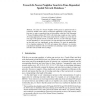Free Online Productivity Tools
i2Speak
i2Symbol
i2OCR
iTex2Img
iWeb2Print
iWeb2Shot
i2Type
iPdf2Split
iPdf2Merge
i2Bopomofo
i2Arabic
i2Style
i2Image
i2PDF
iLatex2Rtf
Sci2ools
DNIS
2010
Springer
2010
Springer
Towards K-Nearest Neighbor Search in Time-Dependent Spatial Network Databases
The class of k Nearest Neighbor (kNN) queries in spatial networks is extensively studied in the context of numerous applications. In this paper, for the first time we study a generalized form of this problem, called the Time-Dependent k Nearest Neighbor problem (TD-kNN) with which edge-weights are time variable. All existing approaches for kNN search assume that the weight (e.g., travel-time) of each edge of the spatial network is constant. However, in real-world edge-weights are time-dependent (i.e., the arrival-time to an edge determines the actual travel-time on that edge) and vary significantly in short durations. We study the applicability of two baseline solutions for TD-kNN and compare their efficiency via extensive experimental evaluations with real-world data-sets, including a variety of large spatial networks with real traffic-data recordings.
| Added | 18 May 2010 |
| Updated | 18 May 2010 |
| Type | Conference |
| Year | 2010 |
| Where | DNIS |
| Authors | Ugur Demiryurek, Farnoush Banaei Kashani, Cyrus Shahabi |
Comments (0)

